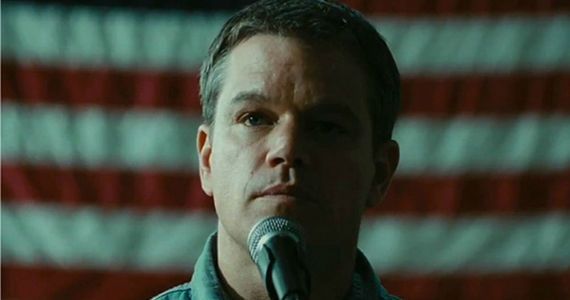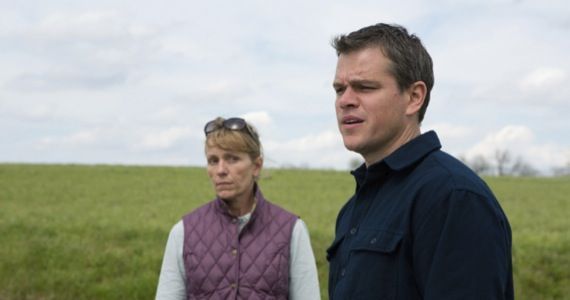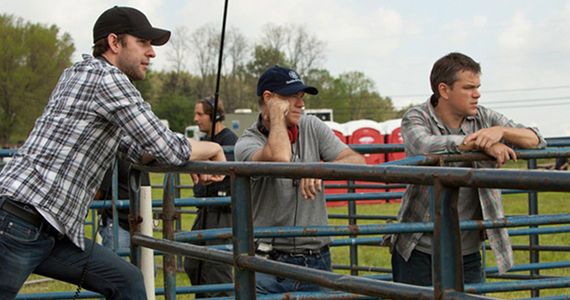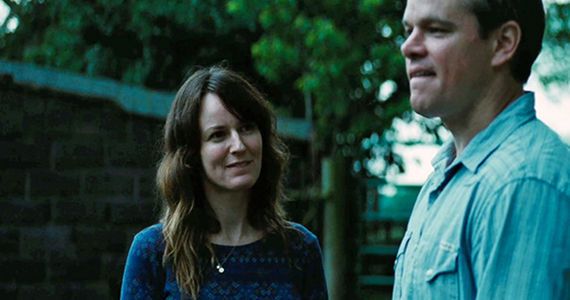Could it be that Ben Affleck is not returning childhood pal Matt Damon's calls, forcing Matt to find a new writing partner? Well, sure Ben may be busy basking in the glory of Argo, but according to Matt, who met his new writing buddy John Krasinski (of The Office fame) through Emily Blunt - John's wife and Matt's co-star in The Adjustment Bureau - the two 'creatively clicked.'
At the recent press junket for Damon and Krasinski's new film Promised Land, Matt 'fessed up to them watching The Little Mermaid whilst writing the film - but more on that later….. (Be sure to also check out our Promised Land Review.)
It is safe to state that despite Matt's ten year writing absence since Gerry (which he co-wrote with the younger Affleck sibling, Casey); and scooping up an Oscar for writing Good Will Hunting with Ben in '97, he hasn't lost his pen panache.
As well as co-writing/co-producing, Matt also stars in Promised Land, a heart-felt drama about a community divided over an environmental decision for the prosperity of their small town. The overachiever was even slated to direct too, but was forced to pull out due to a scheduling conflict with a prior film commitment. But it didn't take long for Matt to hand over the directing reigns to good friend, Gus Van Sant (Milk, Drugstore Cowboy), who previously directed him in GWH and Gerry.
Promised Land sees Damon as Steve Butler, a natural gas company rep who encounters more resistance than he bargained for when trying to buy up drilling rights on struggling farmers' land. Steve, along with his business partner Sue Thomason (Frances McDormand), have been dispatched to McKinley, a rural Pennsylvanian town facing economic decline in recent years. The fast-talking sales executives attempt to entice the locals with a monetary offer - aka 'fracking money' - they can't refuse in exchange for drilling rights to their properties, which could 'save' their town from going in the red.
The potential environmental effect of the hydraulic fracturing known as 'fracking' is downplayed by the suits. They disregard hearsay about underground water being contaminated, which could possibly result in poisoned crops and death of cattle. Soon what seems like an easy job for Steve and Sarah quickly becomes complicated by the objection of retired schoolteacher, Frank Yates (Academy Award nominee, Hal Holbrook). There is also support from a grassroots movement led by Dustin Noble (John Krasinski), who suddenly rolls into town. And as if Steve's heartstrings needed further tugging, he meets a local, Alice (Rosemarie DeWitt), one night at the town bar, who influences his viewpoint.
If you're not familiar with 'fracking' - and why would be you unless you live or have worked on a farm - then check out What is Fracking? which explains in layman's terms the ins and outs of the process.
We caught up with Damon to examine the very realistic nature of the township dilemma. He opened up about reuniting with Gus Van Sant, the man who launched his career and helped him win that Oscar; and he touches on the value of writing giving him longevity in Hollywood, should his acting career go down the toilet…. (Somehow Matt, we don't think that's going to happen but we're happy you have a Plan B).
SR: You’re not exactly a rural kid, you're an East Coaster, so what attracted you to write this story?
MD: What we really wanted to write about was America right now. Like where we are today. And you know, we were talking about American identity, and where we’ve come from and where we are and where we’re headed. We knew that we wanted to have a hopeful ending and we wanted it to be pro-community, and a pro-democracy type of movie. John had kicked around ideas with Dave Eggers (who came up with the original story) about these salespeople coming to a town. Then Dave had to go write a book, which he does often and well, and so John brought this to me and we agreed to attempt to write it.
SR: How did your busy schedules allow this to happen?
MD: He was doing ['The Office'] and I was doing 'We Bought a Zoo,' out in California. And so he would show up on a Saturday morning for breakfast and then we’d write all day and end with dinner, and then do it again on Sunday and.....
SR: He said you watched 'The Little Mermaid' many times throughout the day…
MD: (Laughs) Yeah, I have four little girls… and I bet he could sing you every song! And then during the week we’d revise on our own, and scribble notes in the margins and then we’d come back and do it again. Within a couple weeks it was clear, you know, we were really making progress and it was good. We started saying: "Well, I think we might actually make a movie here. This could really happen."
SR: Did you already have a lot of knowledge about fracking or did you have to do a lot of research?
MD: We did a lot of research. I'd seen stories on it but hadn't really been paying attention to it. You know I would go online, but I wouldn't read the articles, you know with four young kids, I just wasn't engaged with it really at all. But then it became a potential backdrop for our movie and we really started looking at it. And the more we looked at it we went,"Wow, this is actually perfect because people are so divided." The issues are so complex. It is a temporary lifeline to some people. There are potential downstream horrific outcomes. If you believe the energy industry you know there are potential downstream benefits that you can't even imagine. It's such a high-stakes game that it was a perfect place to set a movie about the decisions we make as communities and taking responsibility for them.
SR: Can you talk about reuniting with Gus again, as it had been fifteen years since Good Will Hunting? Did you take time to reflect on where you're at now in that process?
MD: My life is different from fifteen years ago, but my love of doing this hasn't changed at all, and I just know more. I have more experience than I had fifteen years ago. I appreciated Gus more this time because, you know, Gus is one of those great directors who's very relaxed and calm. And if you didn't know him, you wouldn't think he was doing very much, but he in fact is doing quite a bit. This time around, I was in a better position to see just how he was doing it. And also, you know, because I prepared it as a director, I was able to see a lot of the things he did that I was going to do and then some things that he did that I hadn't thought of that were just strokes of genius.
SR: Was it a tough decision to give up the director's hat on this film?
MD: Yeah, you know it was tough for me to give it up. But the joke that John and I had was that my greatest contribution as a producer was firing myself as a director, which is probably true because we got Gus. I couldn't do it, for scheduling reasons. I would have been away from my family for too long and that would have distracted me. So, I wouldn’t have done a good job.
SR: So how is it when you're in character and you're hearing other actors say your lines, are you splitting your focus?
MD: Yeah. You can feel it more. It's like you can feel it not working. You know if you and I were doing a scene and having a conversation, if a line wasn't working it wouldn't be working for both of us and you'd feel it, and I'd feel it, because something in the interaction wouldn't be quite right. It's not like putting on a different hat because there's so much overlap in all the disciplines and all these different jobs. Like writing and acting are intertwined a lot of the time and, you know, it's really about problem-solving and I've come to look at it more like a magic trick, you know. When I started out, I really believed I had to live everything and live it all the time and that was the way to do it. And the more I learned about making movies, the more I learned that it really is a magic trick. So if you make yourself a part of a whole team of people who’ve decided what the magic trick is, you have a better chance of making the whole thing really work well. The more experience you have making movies, I think the less selfish you become about your process.
SR: Now, you're more of a seasoned actor, are you choosing roles differently?
MD: Oh, that’s nice of you to say. I feel equally giddy to go to work with Gus. I feel unbelievably lucky to work with people like him over and over again - or Soderbergh, or Clint, or Paul Greengrass, you know? Like I’ve become even more convinced, fifteen years later, that it's a director's medium and the most important choice is the director. I used to think it was all about scripts and the role. And I do look at the role to see if I have something to bring to it, but it's really about working with a director. Like a mediocre script can be made into a great film by a great director, but a mediocre director will make a great script mediocre. And so I guess, that's how my thinking has evolved, which is to say not that much! (Laughs)
SR: Do you ever fear of losing it all?
MD: No. No. Because I have the important things in life (family). You know the career is like...well, look at what happened to Ben you know? He was put in actor jail for a while and we always felt like we could write our way out of that. I mean we came from nowhere, but if you can write then you can write yourself a part, and that's what Ben did. He's done it. He did it once with 'Good Will Hunting' and then he did it again. So it kind of gives me hope that no matter what happens there's always that fall back.
SR: We all really want to see this… will you collaborate with Ben again?
MD: Definitely. Definitely yeah.
-
Promised Land is now playing in theaters. Be sure to read our review.




